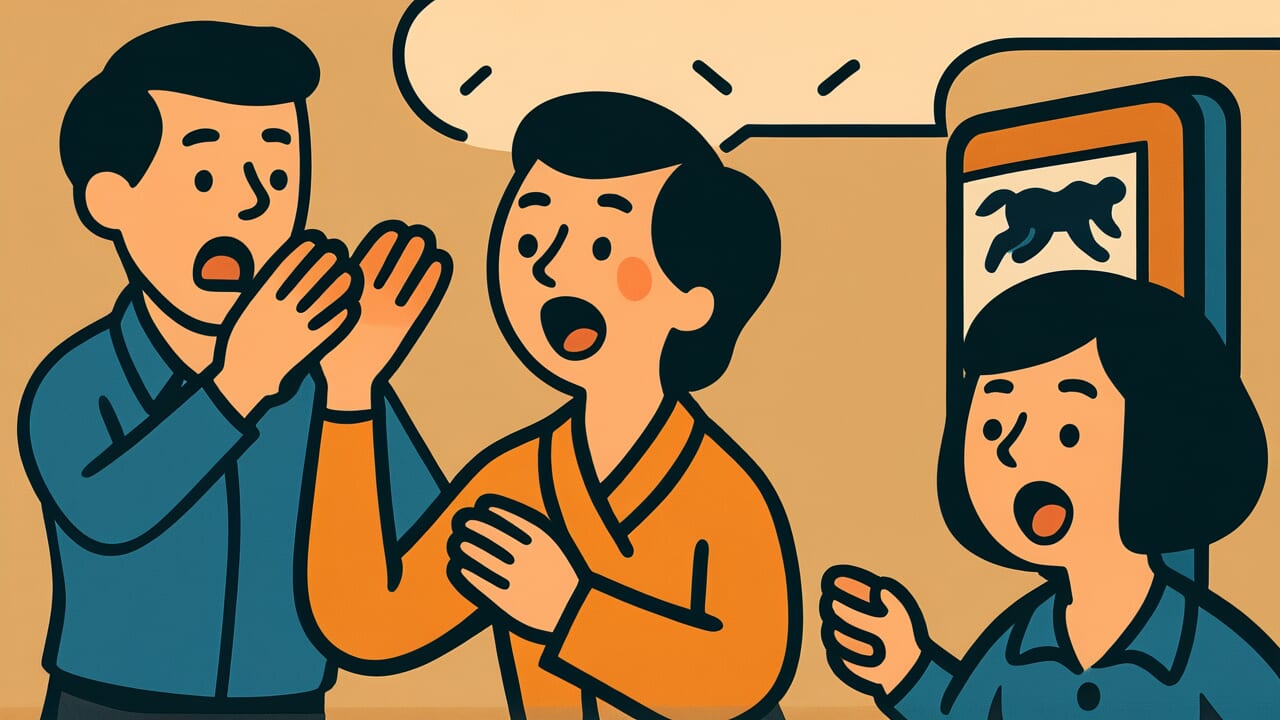How to Read “If you yawn together, you’re cousins for three days”
Akubi wo issho ni sureba mikka itoko
Meaning of “If you yawn together, you’re cousins for three days”
This proverb means that when you catch someone’s yawn, it shows you have some kind of connection with that person. It’s not just a physical reaction.
The saying sees yawning together as proof of an invisible bond between people. It’s a sign that you’re connected in some special way.
You use this proverb when you’re with someone you just met or don’t know well. If their yawn makes you yawn too, you might say this.
For example: “They say if you yawn together, you’re cousins for three days. Maybe we have some connection!”
People use this saying to show that even small coincidences matter. It expresses the idea that human relationships are important and worth caring about.
Today, science can explain why yawns spread from person to person. But this proverb still carries a warm message about valuing connections with others.
It shows how Japanese people treasure even the smallest links between people. No matter how tiny the connection, it’s worth respecting.
Origin and Etymology
There are no clear written records about where this proverb came from. But we can learn interesting things by looking at the words themselves.
The phrase “three-day cousins” is really interesting. Cousins are family members related by blood. But adding “three days” makes it a very short, temporary relationship.
It means you’re not real cousins. But for three days, you can be like cousins. That’s the idea behind these words.
People have noticed for a long time that yawns spread from person to person. When someone yawns, others nearby often yawn too.
Ancient people saw this chain reaction as an invisible connection between humans. They thought it meant something special.
During the Edo period, common people developed wisdom about everyday life. They learned to understand human relationships through small, daily events.
This proverb uses yawning—something everyone experiences—to express the mystery of human connection. It shows how carefully Japanese people observe others.
The saying reflects Japanese culture’s habit of finding meaning in coincidences. Even random moments can be seen as meaningful connections.
Usage Examples
- I just met this person, but they say if you yawn together, you’re cousins for three days. We’ll probably get along well!
- We yawned at the same time. If you yawn together, you’re cousins for three days, so maybe we have some connection.
Universal Wisdom
“If you yawn together, you’re cousins for three days” contains deep insights about human relationships. It teaches us that connections between people come from mysterious forces we can’t explain with logic.
Every day, we pass by countless people. We meet some and say goodbye to others. Among them, certain people catch our attention or make us feel comfortable.
This proverb expresses that mysterious feeling through yawning—something everyone knows. It shows how strange and unexplainable human connections can be.
When yawns spread, it proves you’re open to the other person. Yawns don’t spread easily to people you’re suspicious of or guarded against.
So yawning together means you unconsciously accept and feel empathy for that person. Your guard is down without you even realizing it.
Ancient people had the sensitivity to find connections in these tiny moments. Not family, not old friends—just two people who yawned together.
Yet they called it “three-day cousins” with warmth and affection. This kindness and openness is why this proverb has lasted so long.
Humans can’t live alone. That’s why we should treasure even the smallest connections. This basic human wish is built into this saying.
When AI Hears This
Research on yawn contagion shows clear differences. About 55 percent of close friends catch each other’s yawns. Only about 20 percent of strangers do.
This means yawn spreading isn’t random. Your brain measures how close you feel to someone, and that affects whether you yawn.
The reason is brain cells called mirror neurons. These neurons react when you see someone do something. They make your brain feel like you’re doing it too.
When you see someone yawn, your brain tricks itself into thinking “I’m yawning too.” The interesting part is that this mirroring gets stronger with empathy.
The more you empathize with someone, the stronger your neural synchronization becomes. That makes yawns spread more easily between you.
What’s really fascinating is that this happens completely unconsciously. You don’t have to try to be friendly. The moment a yawn spreads, your brain automatically decides “I’m in sync with this person.”
This works like a marker of closeness at the behavior level. It’s different from DNA that shows blood relations, but it still signals connection.
The “three-day cousins” phrase is actually scientifically accurate. One neural synchronization experience can create a feeling of social bonding similar to genetic bonds.
This proverb figured that out through experience, long before brain science existed.
Lessons for Today
This proverb teaches modern people that connections happen in unexpected moments. We might be losing sight of what really matters.
Today, people worry about social media likes and try to build networks efficiently. But real connections don’t work that way.
True bonds happen in casual moments, like yawning together. You can’t calculate these moments or control them. But that’s exactly what makes them precious.
When your yawn timing matches someone else’s, it’s not just coincidence. It might be proof that your hearts connected.
Modern people need the sensitivity to notice these small connections. Making eye contact with someone on a crowded train matters.
Sharing silent time in an elevator matters. Having a brief conversation with a store clerk matters. All these are seeds that grow into human connections.
Don’t just look for big, important meetings. Value the tiny moments in daily life. Relationships can start from there too.
This proverb gently teaches us this important lesson about everyday life.



Comments